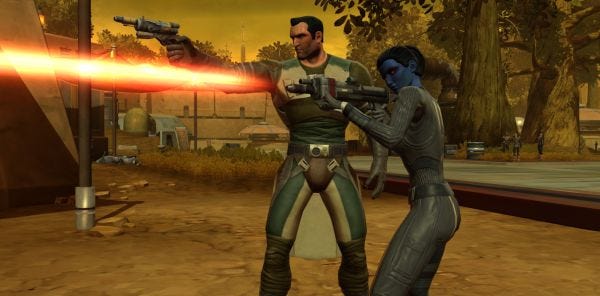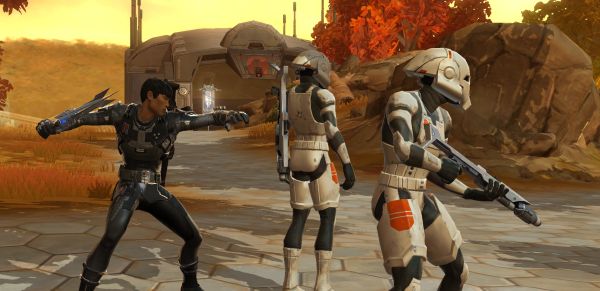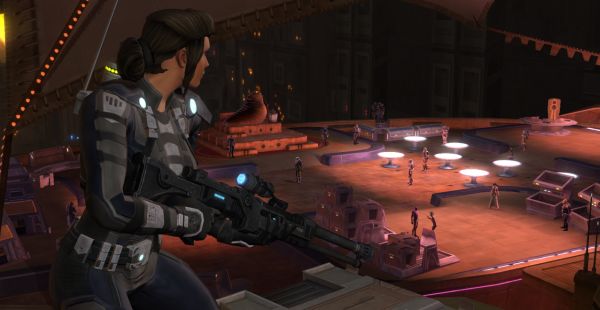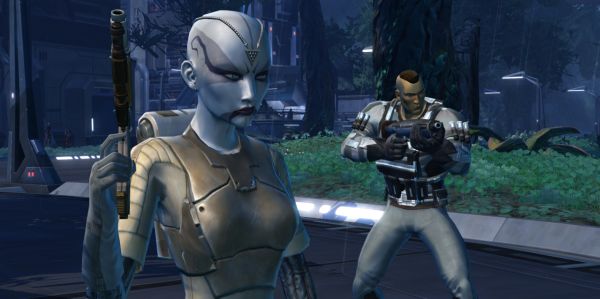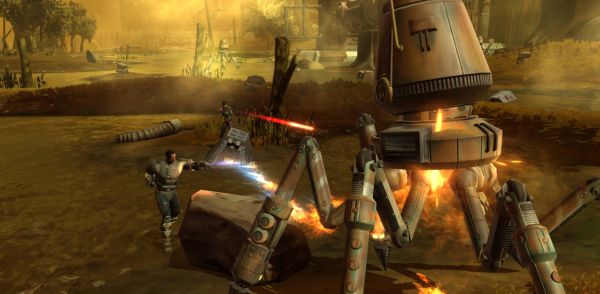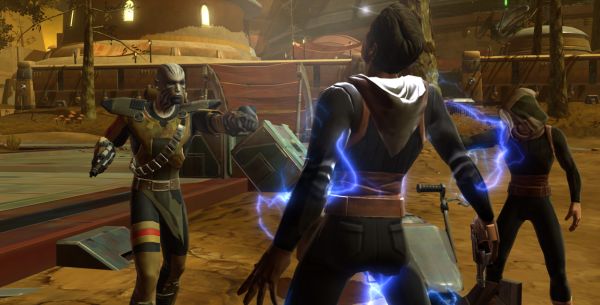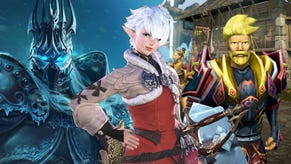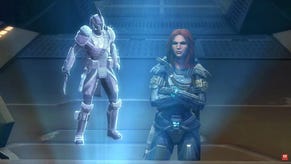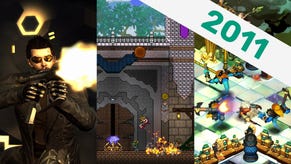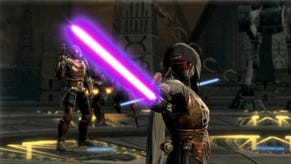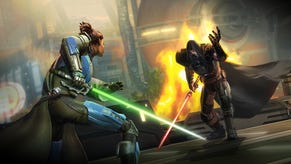Hands On: Star Wars: The Old Republic
I had the chance to sit down to play The Old Republic for a couple of days. News about the PvP side of things will be with you in just over a week, but below are my impressions of a big chunk of time with the Imperial Agent's PvE. There's also some brand new screens, that you can click on for larger versions. How does the game balance RPG and MMO? Is this really KotORs 3, 4 and 5? I have some thoughts to share.
The Old Republic is a game existing in conflict. Certainly there’s the overarching story of Sith vs. Republic, Dark vs Light. There’s also the slightly more meta battle between a clear desire to offer a single player RPG and the efforts to be a multiplayer MMO.
Previously described by BioWare as Knights Of The Old Republic 3, 4 and 5 in one game, there’s no question of TOR’s origins. This is unquestionably in the KotOR universe, and while it doesn’t obviously pick up any narrative from the previous single player games, so much will be familiar to anyone who’s experienced BioWare’s take on the Star Wars universe.
But there’s also no doubt it’s an MMO. With a huge range of classes to choose from, on two opposite sides of the ongoing conflict (and as everyone has already heard, either side will have a completely distinct game with no shared missions whatsoever – it’s essentially two MMOs in one), and a world in which you can see everyone else running around, it’s also clearly not KotOR 3.
At the most recent event demonstrating the game I spent two days playing as an Imperial Agent. This is a Sith character, focusing on stealth, subterfuge and sabotage. And perhaps what most surprised me was that this isn’t just what defines my skill tree. It changed how I play the game.
For instance, my character’s opening story was about trying to get information from a local Hutt. But in order to do this I was going to have to go undercover. Of course this meant a mission where I had to steal the clothes of those I was imitating. But what I wasn’t expecting was my character’s voice to change.
It’s odd enough that player’s characters have voices at all. For a game on this scale, the volume of dialogue is astonishing. While they use some tricks with the alien races, who gabble in a limited number of subtitled lines of nonsense, those speaking English speak a lot. My Imperial Agent (let’s call her Impy, since the pre-chosen name was a mess of consonants and apostrophes) had a stern English accent, barking her thoughts dismissively at those deigning to speak to her. But once she went under-cover she adopted an American twang.
It’s that sort of thing – aesthetics, certainly – that make you realise TOR is something different. Especially as this is the first MMO I’ve experienced where you can be a real dick to people.
“Does this sob story have a point?” I asked a lady who was begging me for help in the street. As with KotOR, you can opt out of helping people, or even screw them over, should you choose to. Decisions will win you Dark or Light points, which will define your character, whichever side of the conflict you’re fighting on. I decided as a Sith Imperial Agent, Dark was the only direction to go in.
And this level of story exceeds anything I’ve seen in an MMO. There’s currently nothing else that comes close, with perhaps only The Secret World as a rival for such a narrative-focused approach. Simply the fact that my character pretended to be someone else – Blade, she went by – for such a protracted period, was novel to the point of gripping me. And within that, as I lied and tricked the various residents of this Hutta enclave, I was able to betray at my leisure. I could come out of that situation – a good day’s worth of play – having decided whose side I was really on.
The other thing to note here is that I was playing alone. And there was little impetus to team up with anyone. The story, in fact, encouraged me to be soloing this. This happens to be exactly how I want to play MMOs, so I was delighted. But those who are all about guilds and the like will have to get through some significant sections before they’ll get their way. That’s not to say that you can’t team up, because you absolutely can. Certain areas will be blocked off to someone who’s not the same class as you, and some quests are specific to you, but it’s more the lack of narrative sense that put me off wanting a buddy.
In fact, at the point where you really do need someone else to help you battle through, the game gives you an NPC companion. Luckily for me, one who delighted in my making the cruelest choices.
And then there’s the other side of this conflict. It is an MMO. In some ways this really enhances the feel of a single player approach. I’m doing my own thing, playing on my own, but there’s other real people in the world doing their thing too. If I wanted to, I could ask them for help. As it is, I quite like that they’re there, making the world feel more realistic and lived in.
But of course there come points where you need to be grouped together. Known as Flashpoints, what are essentially enormous dungeons are best played in teams. But they don’t betray the story focus, either. While there’s an enormous amount of fighting to do, you’ll also find yourself in a lot of chats. So how do those work?
It’s the rather elegant solution of rolling for responses. The usual options are there - friendly, ambivalent, cruel, greedy – and everyone playing can choose their preference, and then the game rolls. Certain (as yet unrevealed) aspects of characters can gain influence in these rolls, but basically it’s luck who gets to speak first. And this can have some major impacts.
I continued roleplaying as cruelly as possible, and so when given the choice to release a prisoner we’d interrogated, I opted for needlessly murdering him. My dice won. The choices the others made appeared, and they had all picked letting him live. Tee hee.
But the MMO’s influence doesn’t seem to be all positive. In fact, it’s impossible to shake the feeling that The Old Republic is an RPG frustrated by its online state.
In KotOR, when I’m sent to an ancient temple at the crux of a long series of missions, recovering some vital ancient artifact, I inevitably have to battle my way to the centre. Reaching my goal, I collect my prize, and victoriously make my way to the exit.
In TOR, when I’m sent to an ancient temple at the crux of a long series of missions, recovering some vital ancient artifact, I inevitably have to battle my way to the centre. Reaching my goal, I collect my prize, and then have to kill all the same creatures I fought on the way in. Huh?
The joy is that there’s a long series of missions. That a task does not feel like the latest on a shopping list, but rather a culmination of hours of play. The misery is realising that I’m a fly on the game’s windscreen, my actions immediately wiped away.
Pleasingly, while there are “kill 10 of these” quests, they’re almost hidden. I’m sent to visit someone or other in the next town, but on the way a quest may get subtly added that if I kill ten of something I’ll get a reward. But they’re the thing I’ll encounter on my way there, and the quests seemed to ding as a natural consequence of playing, rather than something I laboriously sought. And because I was really making my way to speak to a man who had a clue for my larger quest, the lack of artifice made me far more comfortable with the extra challenge.
Edit: BioWare have let us know that the demo only showed a fraction of the skills available. And by level 35 the Imperial Agent has over 30 non-passive abilities. So I was quite, quite wrong to criticise the lack there! Sorry about that.
The Imperial Agent was interesting in their use of cover. Only Tabula Rasa has really tried this before, and TOR certainly does a far better job. Holding down Shift revealed all the available cover spots, of which there are always very many, and hitting my cover button Impy would dive and roll into safety. And when in cover I had access to all of my attacks. Out of cover I was far more vulnerable, meaning my class made a genuine difference to how I approached combat. Melee was a last resort, leaving me far better suited to ‘sniping’ from cover.
The range of crafting/skill options is mystifyingly detailed. Reaching a major city, I was overwhelmed by the extraordinary number of choices. Each character can learn three skills, of which only one can be crafting. So perhaps you’ll pick Underworld Trading, Diplomacy and Archaeology? Or Sith Warrior, Bioanalysis, and Cybertech? How about Inquisitor, Skinning and Synth Weaving? I swear I’m not making these up.
I think the crucial thing I took away from two days with the game was that I wanted to carry on. That seems pretty essential. And that’s despite playing in the most hideously hot, sweaty, stinking room packed with fifty equally hideous, hot, sweaty, stinking games journalists. Tough conditions, but not enough to put me off. It frustrates me that I can’t keep playing, and I’m pretty certain that’s the key to both a good story-led RPG and monthly subbed MMO.
Next week we’ll have a preview of the game’s PvP content.
